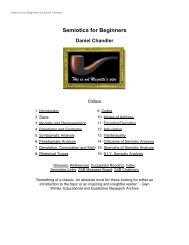Semiotics for Beginners by Daniel Chandler
Semiotics for Beginners by Daniel Chandler
Semiotics for Beginners by Daniel Chandler
You also want an ePaper? Increase the reach of your titles
YUMPU automatically turns print PDFs into web optimized ePapers that Google loves.
<strong>Semiotics</strong> <strong>for</strong> <strong>Beginners</strong> <strong>by</strong> <strong>Daniel</strong> <strong>Chandler</strong><br />
• Real, the (Lacan): For Lacan, 'the Real' is a primal realm where there is no absence, loss or lack. Here, the infant<br />
has no centre of identity and experiences no clear boundaries between itself and the external world. See also:<br />
Imaginary, The, Subject, Symbolic order<br />
• Realism, aesthetic: The usage of this term varies mainly in relation to the various aesthetic movements,<br />
theoretical frameworks and media with which it is associated - so there are many different 'realisms', though a<br />
common realist goal is 'to show things as they really are' (a meaningless notion to a constructivist). In everyday<br />
usage 'realistic' representations are those which are interpreted as being in some sense 'true to life'. Realism<br />
tends to be defined in opposition to other terms (especially romanticism, idealization, artifice, abstraction) and in<br />
turn gives rise to the negatively defined notion of 'anti-realism'. Realist art seeks to represent a world which is<br />
assumed to exist be<strong>for</strong>e, and independently of, the act of representation. Whilst a function of aesthetic realism<br />
(especially in visual media such as photography, film and television) is that the signifier comes to seem identical<br />
with the signified (the signified is <strong>for</strong>egrounded at the expense of the signifier), 'realistic' texts even in such media<br />
involve representational codes which are historically and culturally variable. Realism seeks to naturalize itself.<br />
Readers learn realist codes at an early age - in the case of audio-visual media, through repeated exposure to an<br />
enjoyable personal learning process but without ever being taught to do so (in contrast to the learning of purely<br />
symbolic codes such as that of written language). Familiarity (from endless repetition) leads experienced viewers<br />
of photographic and audio-visual media to take realist representational codes in these media <strong>for</strong> granted so that<br />
these codes retreat to transparency, leaving the illusion of the text as a 'message without a code'. Realism<br />
involves an instrumental view of the medium as a neutral means of representing reality. Realist representational<br />
practices tend to mask the processes involved in producing texts, as if they were slices of life 'untouched <strong>by</strong><br />
human hand'. Aesthetic realism leaves a compelling sense that 'the camera never lies', that television is a<br />
'window on the world' and so on. Psychological realism refers to the coherence and plausibility of characters and<br />
their motivations within narratives. Critics of some <strong>for</strong>ms of realism refer to it as 'illusionism'. Anti-realist aesthetics<br />
involves the principle that 'progressive' texts should reflexively <strong>for</strong>eground their own construction, their own<br />
processes of signification. See also: Aesthetic codes, Mimesis, Naturalism, Realism (objectivism), Reality,<br />
Representational codes<br />
• Realism, nominal: See Nominal realism<br />
• Realism (objectivism): A philosophical (specifically epistemological) stance on 'what is real?' For those drawn<br />
towards philosophical realism, an objective and knowable reality exists indisputably 'outside' us and<br />
independently of our means of apprehending it - there are well-defined objects in the world which have inherent<br />
properties and fixed relations to each other at any instant. Realists usually acknowledge that 'social reality' is<br />
more subjective than 'physical reality' (which is seen as objective). They argue that truth (in the <strong>for</strong>m of facts) can<br />
be generated <strong>by</strong> testing beliefs or theories against external reality, which involves physical constraints on the<br />
idealism of reality being purely a mental construction. Naive realists assume the possibility of 'direct perception' of<br />
the world whilst their critics argue that our experience of the world is unavoidably 'mediated'. Some realists accept<br />
that our perception of reality may be 'distorted' <strong>by</strong> the media which we use to apprehend it but deny that such<br />
media play any part in 'constructing' reality. Realism involves an assumption that the accurate description of<br />
reality is possible. It is reflected in the routine assumptions of 'commonsense' (even in the everyday practices of<br />
constructivists!). Marxist materialism is a version of epistemological realism. Realists tend to criticize constructivist<br />
stances as extreme conventionalism or relativism. See also: Commonsense, Constructivism, Conventionalism,<br />
Correspondence theory of truth, Epistemology, Essentialism, Idealism, Materialism, Nominal realism, Priorism,<br />
Realism, aesthetic, Relativism, epistemological<br />
• Reality/realities: Whilst 'commonsense' suggests that reality exists prior to, and outside signification, according to<br />
constructivists (who refer to 'the construction of reality'), 'reality has authors' and what we experience as reality is<br />
a set of codes which represent the world; realities are made, not given or 'discovered'. 'Reality' is constructed in<br />
representations. Some semioticians, following Barthes, refer to reality as an 'effect' of the sign. Many pluralize the<br />
term or bracket it with quotation marks to emphasize their rejection of the 'realist' notion of a single, objective,<br />
knowable, external reality. Social semioticians acknowledge that not all realities are equal, and are interested in<br />
texts as 'sites of struggle' in which realities are contested. They are also interested in institutional practices of<br />
reality maintenance. Phenomenal reality refers to the psychologically subjective 'lived experience' of individuals<br />
('how things seem to me' - which is typically assumed to be universally shared and equivalent to 'the ways things<br />
are'). See also: Commonsense, Constructivism, Conventionalism, Idealism, Mediation, Realism (objectivism),<br />
Representation<br />
• 'Receiver' and 'sender': See Sender and receiver<br />
• Reductionism/reductivism: Reductionism involves the reduction of explanatory factors involved in some<br />
phenomenon to a single primary function or cause. For instance, nomenclaturism reduces language to the purely<br />
referential function of naming things; technological determinism reduces social change to a single cause;




